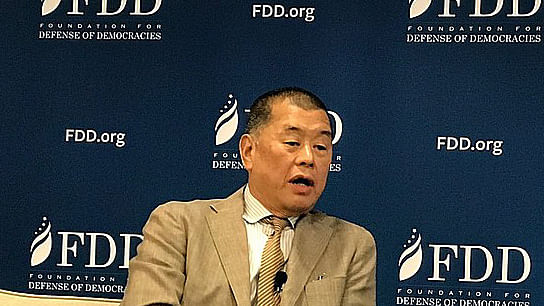Hong Kong: The statements issued by China and Hong Kong after Monday’s arrest of media tycoon Jimmy Lai underlined just how quickly a national security law passed in June is undermining the city’s independent judicial system.
The Hong Kong Police Force on Twitter disputed a claim it searched the newsroom of Lai’s flagship Apple Daily newspaper without a warrant, and made clear that Lai and others were arrested “in suspicion of breaches” of the security law. Chief Executive Carrie Lam’s government used similar language that offered room for a presumption of innocence, saying they were “suspected” of breaching the law and an investigation was underway.
China’s government, meanwhile, effectively declared them all guilty. The Foreign Ministry’s representative in Hong Kong called them “anti-China troublemakers” who put “the long-term stability of Hong Kong in jeopardy.” It accused the Foreign Correspondents’ Club, Hong Kong, of trying to “whitewash” Lai and suggested the organization was “siding with the forces sowing trouble in Hong Kong and China at large.”
The contrast shows the collision of two vastly different legal systems: One aimed at keeping the Communist Party in power, and another steeped in English Common Law tradition that aspired to treat everyone equally before the law. Lai has long been among the Hong Kong activists most criticized by the Chinese government, with an publication of the Communist Party’s highest law enforcement body last year branding him as a member of a new “Gang of Four.”
For decades, Hong Kong’s legal system underpinned its position as Asia’s top financial center — a hub for multinationals and global media companies — as well as a trusted neutral jurisdiction for international arbitration involving major firms and even foreign governments. In just a matter of weeks since China imposed the security law on the former British colony, Hong Kong’s hard-won international legal credibility is swiftly crumbling.
“The huge adverse reaction to the national security law within and outside Hong Kong is an embarrassing setback to the People’s Republic of China’s efforts to cultivate soft power,” said Jerome Cohen, one of the world’s foremost experts on Chinese law, who has taught the subject since 1960. “It is a reminder to the world of the notoriously unfair and arbitrary PRC criminal justice system. Beijing is willing to tolerate this because of the greater importance of repressing opposition, even if merely verbal, within its borders.”
Also read: American journalists in Hong Kong could be Beijing’s next target
A half-dozen nations — including the Australia, Germany and the U.K. — have already suspended extradition arrangements with Hong Kong. More are likely to follow, including the U.S., which has already rescinded Hong Kong’s special trading status under American law.
While the short-term impact of those moves may be limited, the severing of Hong Kong’s international legal ties dents its reputation as a stable and predictable financial and legal center for multinationals. It could also make it harder for the city to track down economic fugitives, allow criminals to evade justice and tarnish years of effort by Beijing to convince the world that China was a responsible international actor.
Even those halfway around the world have been affected.
Samuel Chu awoke in the middle of the night on July 31 to his two mobile phones buzzing with a flurry of calls and messages alerting him to reports that Hong Kong had issued arrest warrants for him and five other overseas activists for violating the security law. An American citizen who divides his time between Washington and Los Angeles, Chu had lobbied the U.S. successfully to punish China’s attempts to quash the city’s democracy movement.
“I do think that this will also put a damper on other foreign citizens in Hong Kong or those who might travel to Hong Kong,” Chu said, adding that he hasn’t received any official notice. “Are they safe? I would think twice if I was a U.S. citizen.”
Hong Kong ranked 16th out of 126 jurisdictions surveyed by the World Justice Project’s Rule of Law Index, an annual survey sometimes cited by Chinese officials. China, by contrast, ranked 88th in the survey, which was based on data collected before Beijing imposed the national security law on Hong Kong.
Hong Kong’s government has tried to calm international criticism of the security law by repeatedly saying it targets only a “very small minority” of radicals and criminals. But Hong Kong officials have shown they have little say in how the law is implemented, and the vague definitions of subversion, secession, terrorism and collusion have all spurred confusion about what is and isn’t allowed.
The situation is a far cry from the 1990s, when Hong Kong sent government lawyers abroad to secure extradition agreements around the world, said Philip Dykes, chairman of the Hong Kong Bar Association and a long-time resident.
“Now we’re going backward — we’re losing major players,” said Dykes, who joined the Attorney General’s Chambers in Hong Kong as a Crown counsel in 1985 and worked in the policy division before heading into private practice in 1991. With or without extradition agreements, foreign countries are probably going to ignore the “exorbitant” global jurisdiction of the Hong Kong security law, he added, while Interpol and global police forces were also very unlikely to act on “red notices” issued by China.
The unpredictability of the law is also likely to make organizations hesitant to hold conferences in Hong Kong, while it could prompt executives to reconsider relocating here, Dykes added. Last year’s unprecedented protests in Hong Kong began over a single extradition bill with mainland China, but the national security law enacted to stem that unrest ended up destroying a number of arrangements with major economies.
That, Dykes said, “is the great irony of it all.”- Bloomberg
Also read: Hong Kong is arresting citizens under new security law over online comments, activity



